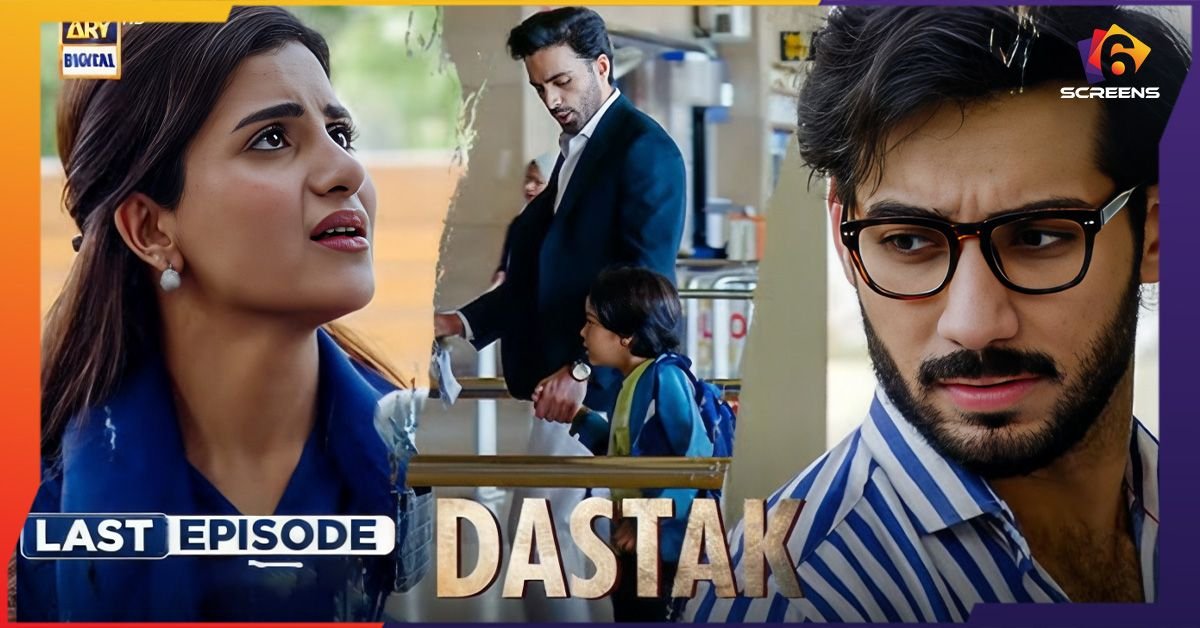
Public Reacts to Dastak’s Final Episode
The final episode of Dastak aired on ARY Digital on July 11, 2025, closing a chapter that had audiences both rooting for and questioning its direction. With 35 episodes behind it, this family drama explored the turbulent journey of Kiran (Sohai Ali Abro), a divorced single mom, her child Shani, and the complex relationships that surrounded them .
1. A Satisfying Closure
Fans celebrated the constraining of Saif’s (Feroze Kadri) malicious plans to whisk Shani abroad. His arrest brought a wave of relief after weeks of tense custody battles. Many viewers shared in the triumph of justice:
“It’s shocking to see Saif in jail, but what’s even more surprising was that Kiran forgave him. Everything that happened in the last episode was something I didn’t expect.”
Surely, it was a twist that resonated deeply, turning justice into personal growth and forgiveness.
2. Adoption & Blended Families
In what felt like a departure from the expected, Faryal (Momina Iqbal) and her husband, Saif (Feroz Kadri), decided to adopt a boy from an orphanage. This courageous storyline reflected evolving views on family structures and inclusivity.
“I was annoyed with how they dragged it but came to really appreciate the last episode. … it was great to see that topics like adoption, women remarrying, and healthy blended families were being promoted.”
Overall, this messaging left viewers heartened — a sign of progress in portrayal of modern Pakistani households.
3. Praise for the Cast & Their Chemistry
The final episode drew universal acclaim for the actors’ emotional gravitas. From soaring performances to nuanced scenes, viewers applauded the main ensemble—particularly Sohai Ali Abro and Ali Raza—as having delivered rich, credible portrayals and an exceptional chemistry. It is evident that the drama was a success and that’s only possible because the actors played their part sincerely.
One fan proclaimed:
“What an excellent drama. I must say I watched it from the start till ending. Sohai Ali Abro and Ali raza nailed it. Favourite drama with beautiful storyline.

4. Dragging vs. Depth: Mixed Opinions
However, Dastak was unable to satisfy all. While the finale garnered praise, many remarked that the drama could have wrapped up sooner. Reddit threads were rife with comments questioning the pacing. One user wrote:
“Yaar, yeh Dastak drama kab khatam hoga? … bewajah elastic ki tarah kheenchtey hi ja rahein hain.”
Another noted:
“Stopped watching since two weeks. Has the story progressed at all?”
Viewers felt that if the core storyline—divorce, child custody, remarriage—had concluded, the extension into secondary conflicts, flashbacks, and stretched subplots felt excessive at times.
5. Subtitle Lessons & Societal Norms
Among the applause, critics also recognized Dastak for imparting subtle, meaningful life lessons: respect for boundaries, accepting change, and embracing blended family dynamics . The storyline enriched the drama with multidimensional characters—Kiran’s strength, Moiz’s acceptance, and Faryal’s (Momina Iqbal) unconventional love.
Faryal’s growth, in particular, was highlighted as a standout moment by viewers.
6. A Fresh Take on Second Marriages
Showcasing acceptance for divorced women and exhibiting respectful second marriages is still not accepted on Pakistani television. Dastak quietly pushed boundaries—and audiences noticed. The fiction struck a chord with evolving viewers:
“Faryal adore shani and afrasyab at the end as well. Really enjoyed the freshness and awareness this drama brought.”
The narrative about step-parental love and stepparenting hiccups resonated with many families.

7. OST& Cinematic Highlights
As Dastak ends, fans not only loved the storyline but also praised the soulful voice of Rahat Fateh Ali in the ost. His passionate voice added an emotional touch to the climax.
8. Dastak leaves a lasting impact
After Dastak’s last episode, many are already wondering what’s coming next on ARY Digital. But this drama leaves behind a mark. Storytelling that respects and uplifts, while not shying away from real social norms. It showed that change is inevitable, and that even in the face of societal stigma, remarriage, adoption, and forgiveness can disseminate within Pakistani family structures.
9. In Conclusion
Dastak may have overstayed than expected, but its final episode delivered a payoff that earned viewers’ trust. By focusing on adoption, co-parenting, and second marriages, it altered the current societal norms. The emotional depth, realistic dialogues, and moral clarity made Dastak an outstanding drama on television. For all the scraping, dragging, and dramatic turns—it closed confidently, leaving audiences hopeful for redemption, unity, and growth in real life as much as on screen.

